|
 |
Dr. Santosh Yadav
M.D. Homeopath
Ph.D. Homeopath
|
|
|
| |
|
|
|
|
|
|
|
Are you tormented from red scaly patches over your skin that fixes people's eyes at you causing embarrasment? In that case this could be a symptoms of 'Psoriasis', a recurring inflammatory unsightly skin condition.
Psoriasis is a common skin disease that affects the life cycle of skin cells. Normally, new cells take about a month to move from the lowest skin layer where they are produced, to the outermost layer where they die and flake off. With psoriasis, the entire life cycle takes only days. As a result, cells build up rapidly, forming thick silvery scales and itchy, dry, red patches that are sometimes painful.
Psoriasis affects the skin and joints. It commonly causes red and scaly patches to appear on the skin. The scaly patches called psoriatic plaques, are areas of inflammation and excessive skin production. Plaques frequently occur on the skin of the elbows and knees, but can affect any area including the scalp and genitals. Psoriasis is hypothesized to be immune-mediated and is not contagious. |
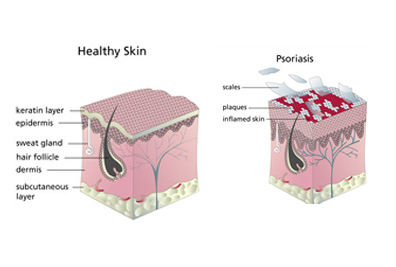 |
|
|
Psoriasis is a chronic recurring condition which varies in severity from minor localized patches to complete body coverage. fingernails and toenails are frequently affected and when it comes to joints it is known as psoriatic arthritis.The course of psoriasis is characterized by remissions and relapses.
There are various factors ranging from climate, stress, infections and injuries that can trigger flare up of psoriasis within short span of time. On the other hand there are certain factors such as sunlight that significantly reduces the intensity of psoriasis.
Psoriasis is categorized as mild, moderate or severe, depending on the percentage of body surface involved and the impact on the patient's quality of life. |
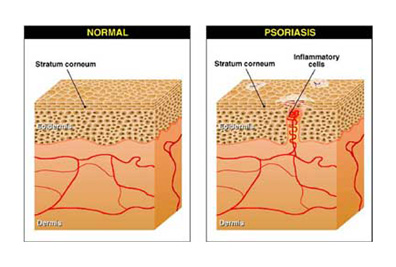 |
The phrase 'the heartbreak of psoriasis' is often used both seriously and ironically to describe the emotional impact of psoriasis. It may include both the effect of having a chronic uncomfortable disorder and the social effects of being self conscious of one's appearance. Living with psoriasis can be physically and emotionally challenging. In addition to its physical outcome on the skin, psoriasis can also have a devastating influence on your emotional, psychological and social well being.
Psoriasis has been shown to affect the health-related quality of life to an extent similar to the effects of other chronic diseases such as depression, myocardial infarction, hypertension, congestive heart failure or type 2 diabetes mellitus.
Depending on the severity and location of psoriasis outbreaks, individuals may experience significant physical discomfort and some disability. Itching and pain can interfere with basic functions, such as self-care, walking and sleep.
Plaques on hands and feet can prevent individuals from working at certain occupations, playing some sport, and caring for family members or a home. There may also be feelings that psoriasis has limited the patient's career success because employers did not understand the nature of the disease.
Patients may also deny themselves enjoyment of leisure activities because of embarrassment and fear of rejection, and psoriasis often makes patients feel unattractive to the opposite sex. Psychological distress can lead to significant depression and social isolation. |
| Causes of Psoriasis |
The exact cause of psoriasis is not fully understood. The processes involved in the development of psoriasis as largely understood. Although cold climate and some form of injury can aggravate the problem they cannot be labelled as the cause of disease.
The precise cause of psoriasis continues to elude the medical fraternity. However, ongoing research in this field has improved our understanding of this disease to some extent. The recent discoveries point to an abnormality in the functioning of key white cells in the blood stream triggering inflammation in the skin. Because of the inflammation, the skin sheds too rapidly, every three to four days. |
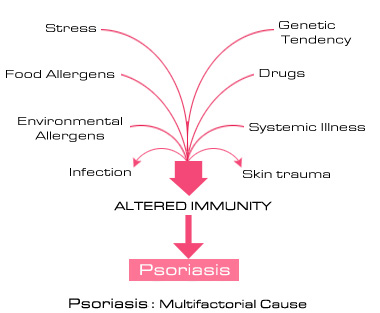 |
Actually, psoriasis stems from internal disharmony of the body (in terms of disturbed immunity and genetic predisposition) topped with some environmental triggers.
Internal factors:
1. Defective immune system: Recent research indicates that psoriasis is likely to be a disorder of the immune system. This system includes a type of white blood cell, called a T cell, that normally helps protect the body against infection and disease. Scientists now think that, in psoriasis, an abnormal immune system causes activity by T cells in the skin. These T cells trigger the inflammation and excessive skin cell reproduction seen in people with psoriasis.
2. Genetics and heredity: In about one-third of the cases, psoriasis is inherited. Often, the person with psoriasis has a parent or grandparent who also has the condition. In terms of probability it has been estimated that a person with one affected parent has about a 10% chance of also being affected. Having two parents with psoriasis increases the chances to about 30%.
Researchers are studying large families affected by psoriasis to identify a gene or genes that cause the disease. (Genes govern every bodily function and determine the inherited traits passed from parent to child.)External factors:
People with psoriasis may notice that there are times when their skin worsens, then improves. Conditions that may cause relapses of flare-ups include:
1. Climate: Studies indicate that cold weather may be a predisposing effect or trigger for psoriasis, in contradistinction to hot and sunny climate that appears to be beneficial.
2. Infections: Both dermatological and systemic infections have been known to trigger the onset of psoriasis or a worsening of psoriasis. Systemic infections that have been associated with triggering include viral upper respiratory disease, streptococcal pharyngitis ("strep throat"), and human immunodeficiency virus (HIV). Staphylococcal skin infections (boils) have been a trigger.
3. Stress: Psychological stress is the cause as well as out come of disease like psoriasis. It is a well-known fact that there is inseparable bond between mind and body and psyche plays vital role in maintaining health or causing diseases.
It is a common experience in practice of patient reporting the onset of psoriasis following major stress like divorce, death of close relatives, change of job, unhealthy family relationships etc and this perception of patients that psychological stress can worsen psoriasis has been supported in clinical studies. |
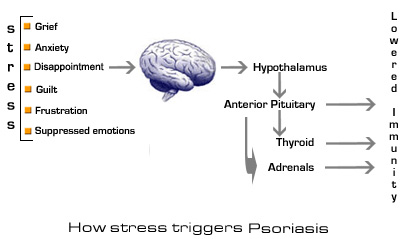 |
4. Certain medicines: Certain medicines, most notably beta-blockers, which are used to treat high blood pressure, and lithium or drugs used to treat depression, may trigger an outbreak or worsen the disease. The drugs may be listed as: lithium, anti-malarials, mepacrine, NSAIDs, beta-blockers, alcohol.
5. Physical trauma: People often notice new spots 10 to 14 days after the skin is cut, scratched, rubbed, or severely sunburned. Analysis of patient records has indicated that up to 50 percent of persons with psoriasis have had a "Koebner’s phenomenon" experience—that is, have had a psoriatic lesion develop at the site of an injury or skin condition.
A broad range of skin injuries and skin conditions have been linked with Koebner’s phenomenon:
Skin Conditions:
• Boils
• Dermatitis
• Herpes blisters
• Lichen Planus
• Skin parasites (scabies)
• Vitiligo
Skin Trauma:
• Acupuncture
• Bites, Cuts and scrapes
• Bruises, Burns
• Chemical irritation
• Pressure against the skin
• Shaving
• Sunburn and peeling
• Adhesive taping
• Tattoos
• Vaccinations |
| Symptoms of Psoriasis |
These may vary from person to person and may include :
Red patches of skin covered with silvery scales.
Small scaling spots (seen in children).
Dry, cracked skin that may bleed.
Blisters with pus.
Fever in pustular psoriasis.
Itching, burning, soreness.
Thickened, pitted or ridged nails.
Swollen and stiff joints.
Discomfort and insomnia due to itching.
Low self esteem and embarrassment because of one's looks.
Social isolation.
Suicidal thoughts. |
| Types of Psoriasis |
a) Plaque psoriasis : Most common form; also known as psoriasis vulgaris. It may occur anywhere on the body, including the genitals and soft tissues inside the mouth.
|
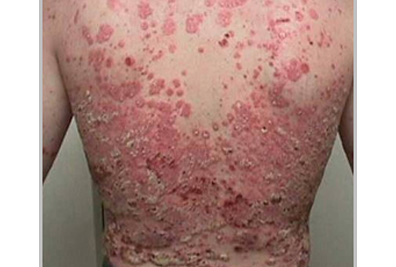 |
| b)Nail psoriasis : About 50% of persons with active psoriasis have psoriatic changes in fingernails and/or toenails. Nail plate is deeply pitted; nail has a yellow to yellow-pink discoloration; white areas appear under the nail plate; nail plate crumbles in yellowish patches; and the nail may be entirely lost. |
| |
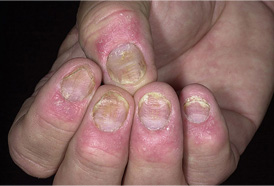 |
| c)Scalp psoriasis. |
| |
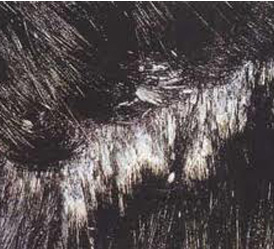 |
d)Guttate psoriasis : This cultivates in children and young adults following a throat (strepto) infection. It materializes as small dot sized red spots on the chest, arms and legs.
|
| |
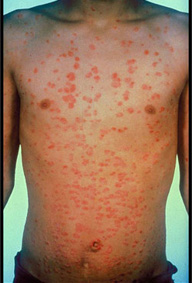 |
e)Inverse psoriasis : Mainly affecting the skin in the armpits, groin, under the breasts and around the genitals. More common in overweight people and is worsened by friction and sweating.
|
| |
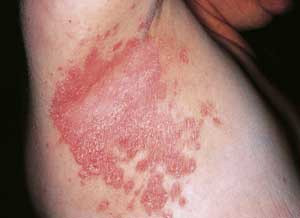 |
f)Pustular psoriasis :This appears as tender areas of fiery red skin with white pus filled blisters mainly on palms and soles. It can also cause fever, chills, severe itching, weight loss and fatigue.
|
| |
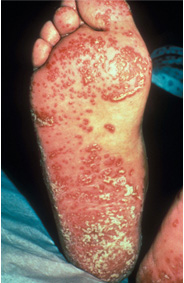 |
| g)Erythrodermic psoriasis :It can cover the entire body with a red, peeling rash that can itch or burn intensely. This can be life threatening because the skin loses its defensive function and may not be able to safeguard against heat and fluid loss nor preclude harmful bacteria from entering the body. |
| |
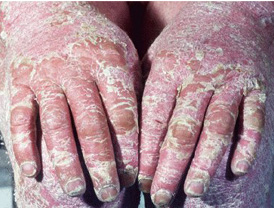 |
Homeopathic Treatment of Psoriasis
Homeopathic treatment for psoriasis has been found to be extremely effective. Homeopathy contemplates psoriasis as an immune interceded condition instigated by faulty signals in the body's immune system.
Homeopathic medicines are safe and natural with no probability of side effects and treats psoriasis without using any local ointments. The medicines work towards impeding the proliferation of skin cells which inevitably alleviates excessive scaling.
Homeopathy remedies stimulate the body's own healing potential by restoring the balance of the immune system and countering the genetic predisposition.
Homeopathic treatment will control the number and severity of lesions, minimize flare ups, improve your quality of life, reduce disability and in most cases bring about a permanent cure.
Psoriasis is an obstinate and chronic disease. There is no shortcut to its cure. The duration of treatment varies from case to case depending on the following factors : |
| Duration of Psoriasis |
Areas affected. Affection of scalp and nails take longer.
Extent of spread.
Previous medications (Extensive use of oral cortisone or steroids may delay the course of treatment.).
General health and associated diseases.
Most patients of psoriasis observe positive results in about 3 to 5 weeks of homeopathic treatment, though the complete curative process can take about 1 to 2 years.
Why homeopathy for psoriasis?
Last but not the least, psoriasis is not an external but an internal disorder, arising out of faulty immune system with genetic predispositions. Needless to say that the disease is deep seated and calls for well planned deep acting homeopathic medicines. Allopathic treatment with steroids can suppress the symptoms of the disease but cannot cure the disease. On the other hand, it is homeopathic treatment that has the potential to stimulate body's natural healing capacity and to restore the disturbed immune system.
Homeopathy has gained a good reputation for curing psoriasis and other chronic skin diseases. No sticky external applications and no steroid are used. It cures naturally by increasing one's immunity and hence can cure it permanently. Medicines are completely harmless and can be taken for longer durations very safely. After starting the homeopathic treatment, the itching, burning pain gets reduced, eruptions disappear gradually and the patient feels good in every way. Homeopathy targets the source of the problem with no damaging side effects.
There are various homoeopathy medicines which give great relief in psoriasis. However, the correct choice and the resulting relief is a matter of experience and right judgment on the part of the homeopathic doctor. The treatment is decided after thorough case taking of the patient. Thus homeopathic remedies of psoriasis are tailor made unlike allopathic in which all patients receive the same drugs although trade name may be different. |
| |
|
|